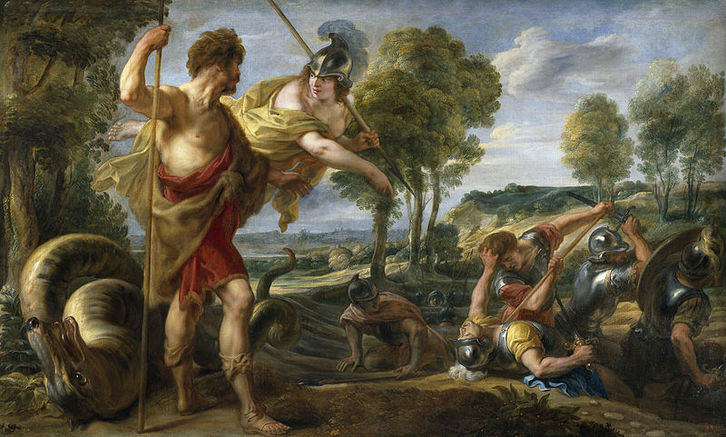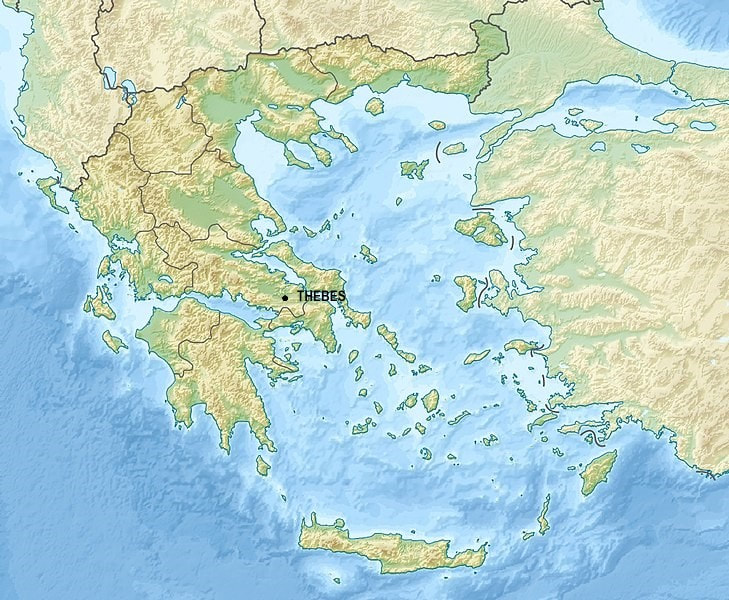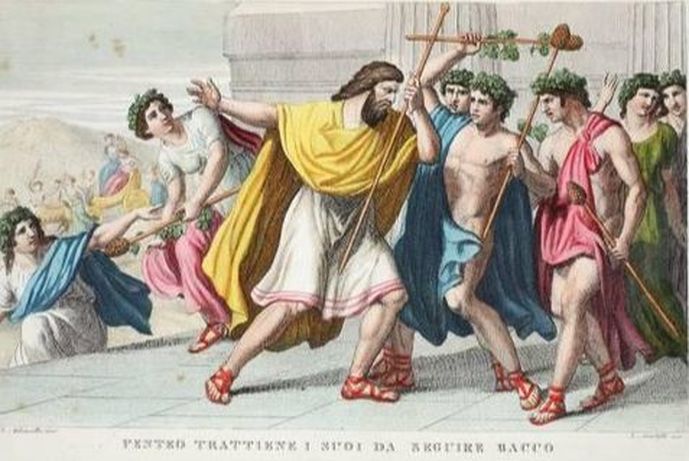THE CITY OF THEBES IN GREEK MYTHOLOGY
|
Now a bustling market town of 20,000 people, the Greek city of Thebes was once one of antiquity’s dominant city states; as such it was, and is, a city that was central to many tales from Greek mythology.
In Greek mythology, Thebes was a city linked closely with Cadmus, Dionysus and Oedipus, but even the likes of Heracles had links with the settlement. |
Cadmus, the Spartoi and Thebes
The story of Thebes normally commenced with the story of Cadmus, the Phoenician prince who left his homeland to search for his sister, Europa. Cadmus was advised by the Oracle of Delphi to give up his search, and instead build a new city; the location of this new city being the place where a cow would lead Cadmus and his retinue to.
Cadmus followed the cow to Boeotia, and where it came to rest was to be a new city.
Before building could commence, Cadmus lost his men to the attack of the Ismenian Dragon, but guided by Athena, Cadmus would sow the teeth of the dragon, to bring forth the Spartoi.
Thus it was that Cadmus and the Spartoi built a new city, a city called Cadmea, or Cadmeia, named in honour of Cadmus.
Cadmus followed the cow to Boeotia, and where it came to rest was to be a new city.
Before building could commence, Cadmus lost his men to the attack of the Ismenian Dragon, but guided by Athena, Cadmus would sow the teeth of the dragon, to bring forth the Spartoi.
Thus it was that Cadmus and the Spartoi built a new city, a city called Cadmea, or Cadmeia, named in honour of Cadmus.
The Land of OgygesThe land where the city of Thebes was built, was the land of Ogyges, the early ruler of Boeotia, and king of the Ectenes.
It was in the time of Ogyges though, that a flood devastated Boeotia, possibly the Great Deluge linked with Deucalion and Pyrrha; and hence Cadmus came to a land devoid of settlement or people. |
|
Thebes and the DESCENDANTS of Cadmus
Cadmus would have to serve a period of servitude to the god Ares, for the killing of the Ismenian Dragon, although ancient sources differ as to how long this servitude was for, or when it occurred in the life of Cadmus.
Cadmus would though end up finding himself a wife in the form of Harmonia, a daughter of Ares and Aphrodite.
Cadmus would become father to a son Polydorus, and four daughters, Ino, Autonoe, Semele, and Agave. Each of the children of Cadmus would have a connection with Thebes, to a greater or lesser degree.
Semele would of course become a lover of Zeus, who would then give birth to Dionysus, the Greek god with the closest association with Thebes; and in time Polydorus would become King of Thebes.
When of advanced age, Cadmus would abdicate from the throne of Cadmea (Thebes), but with Polydorus too young to rule, the throne passed to Cadmus's grandson, Pentheus, the son of Agave and the Spartoi Echion.
Cadmus would though end up finding himself a wife in the form of Harmonia, a daughter of Ares and Aphrodite.
Cadmus would become father to a son Polydorus, and four daughters, Ino, Autonoe, Semele, and Agave. Each of the children of Cadmus would have a connection with Thebes, to a greater or lesser degree.
Semele would of course become a lover of Zeus, who would then give birth to Dionysus, the Greek god with the closest association with Thebes; and in time Polydorus would become King of Thebes.
When of advanced age, Cadmus would abdicate from the throne of Cadmea (Thebes), but with Polydorus too young to rule, the throne passed to Cadmus's grandson, Pentheus, the son of Agave and the Spartoi Echion.
Thebes in the Time of Pentheus
During the time of Pentheus, Dionysus returned to Thebes following his travels in Asia. The aunts of Dionysus, Agave Ino and Autonoe, had already spread a rumour the Dionysus was born from a relationship between Semele and a commoner, and Pentheus also denied the divinity of Zeus's son.
Dionysus thus transformed the women of Thebes into Maenads, his followers, who would undertake Bacchic rituals upon Mount Cithaeron.
Dionysus would ignore the advice of Cadmus and the seer Tiersias, and began to crack down on the followers of Dionysus. Dionysus though, would induce Pentheus to spy upon the activities of the Maenads, but the King of Thebes was discovered, and his own mother, and aunts, would end up tear Pentheus limb from limb.
Whilst Pentheus' family line would continue through his son, Menoeceus, but the throne of Thebes passed to Cadmus' son, Polydorus.
Dionysus thus transformed the women of Thebes into Maenads, his followers, who would undertake Bacchic rituals upon Mount Cithaeron.
Dionysus would ignore the advice of Cadmus and the seer Tiersias, and began to crack down on the followers of Dionysus. Dionysus though, would induce Pentheus to spy upon the activities of the Maenads, but the King of Thebes was discovered, and his own mother, and aunts, would end up tear Pentheus limb from limb.
Whilst Pentheus' family line would continue through his son, Menoeceus, but the throne of Thebes passed to Cadmus' son, Polydorus.
Kings and Regents For Thebes
|
The rule of Polydorus was seemingly a short one, for whilst he had a son, Labdacus, by Nycteis, Labdacus was still a child when Polydorus died.
Nycteis was the daughter of Nycteus, a man who arrived in Thebes, with his brother Lycus, when both were in flight, for they had killed King Phlegya, a King of Boeotia. Polydorus’ father-in-law, Nycteus, would become Regent of Thebes, for Labdacus, when Polydorus died. Nycteus had another daughter, Antiope, who became a lover of Zeus, and was pregnant with two sons, Amphion and Zethus, when she fled Thebes, fearful of her father’s reaction. Antiope found refuge in Sicyon, but her presence their with King Epopeus, saw Nycteus take Thebes to war with Sicyon. This was the first war for the Thebans. Nycteus was mortally wounded in the war, but before he died he appointed his brother Lycus Regent of Thebes. Eventually though, Labdacus, son of Polydorus, was old enough to rule, but the new King of Thebes made the same mistakes as his predecessors, for Labdacus led an unsuccessful war against Athens, and then also opposed the worship of Dionysus in Thebes, and so Labdacus, like Pentheus, was killed by the Maenads. |
|
Thebes in Greek Mythology
Cadmus
Harmonia
Dragon of Ares
Spartoi
Antiope
Sphinx
Teumessian Fox - Laelaps
Seven Against Thebes
Epigoni
Niobe
Amphitryon - Alcmene - Heracles
Actaeon
Thebe
Harmonia
Dragon of Ares
Spartoi
Antiope
Sphinx
Teumessian Fox - Laelaps
Seven Against Thebes
Epigoni
Niobe
Amphitryon - Alcmene - Heracles
Actaeon
Thebe
|
|


